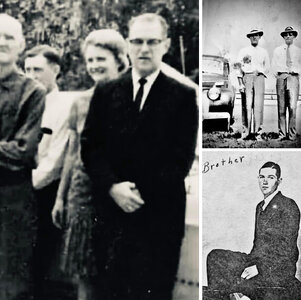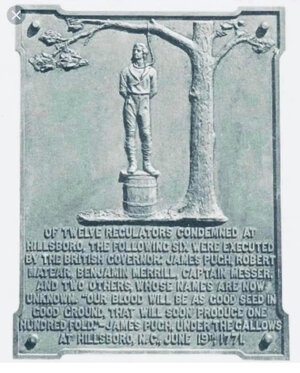
This is kind of a strange connection but bear with me. My Deddy was missing all but his thumb on his left hand. He lost those fingers in a molasses mill when he was in his late teens. His first cousin Shelton was missing two fingers. I think his accident occurred in a sawmill. Great Uncle June Ivey was shy his entire left hand. There was, frankly, a pretty steady stream of men with missing digits and parts that passed through
#BonleeHardware when I think back on it.
Chalk it up to close work with machines that cut, crush, and rip and a general lack of safety regulations. Combine that with a period (1940-50s) when the lumber business boomed and you get those waylaid fingers, toes, and hands. I only remember one missing leg but along with fingers were some absent arms too.
In the photo you can see how my Deddy would stand for photographs, his right hand covering the injury. The missing fingers never really seemed to bother him in doing most things. It did keep him from being a baseball player or ever playing catch with me. Otherwise at least by the time I came along he had figured out alternative ways of making do. To watch him tie his shoe was a wonder and he put a nail in between his thumb and nub of a hand, took good aim and drove it deep with a decisive first whack of his hammer. He even had a nimble way of buttoning his shirt that was downright graceful. Cufflinks were tough but they are for most everybody.
His disability made him big on thinking things through before tackling a task. Today you’d call that visualizing. I saw him move refrigerators and heavy objects many times by ‘walking’ it or even more cleverly by using a towel or piece of cardboard wedged beneath as a slide. He worked with gravity, and leverage was his pal. So many times I watched him pause rather than rush in on a task as he imagined the steps to come.
I’m not really sure exactly what this has to do with a 19th century prosthetic leg factory in the Raleigh except to suggest that North Carolinians have a long history of losing limbs and body parts and coming up with work-arounds.
#OTD (June 18) in 1867 the state artificial limb factory closed, having provided prosthetics to 1500+ Confederate vets. North Carolina was the 1st of the defeated states to offer this service. The factory was in Raleigh.
N.C.’s Limb Replacement Program
In the photograph below cropped from a larger family portrait note that Deddy, standing by Momma with his father Willis, Uncle Gene, and Aunt Ethel, has covered his fingerless hand with his hale and hearty one. He did that in every posed photo I have ever seen. In another photo he stands with Uncle Cecil, both be-hatted and by a late ‘30s sedan, and has placed his left hand behind him. The image of him, youngish, slim and suited, was taken before his accident and thus show his fingers. I so clearly remember standing by my Momma as we looked down at Deddy in his casket, his right hand covering the left, hiding one last time the fundamental challenge, always overcome, of his long (93 years) and exceptional life.


